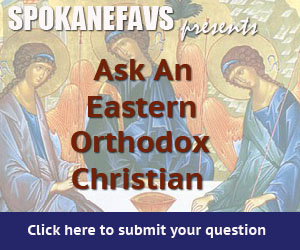What would you like to know about the Eastern Orthodox Christian faith? Submit your question.
What does Orthodoxy teach about free will?

In Galatians 2: 20, Saint Paul says, “…it is no longer I who live, but Christ who lives in me…” Once the choice is made to have Christ live in you and to submit to his will, one is left with making choices that are believed to be for the glory of God and his neighbor.
We know that God’s will for us is all (100 percent) for our benefit and eternal life with him. Abiding in us he aids us in governing our feelings, our mind, and thoughts. It is said when the Kingdom of God enters a man’s heart, the veil of ignorance is discarded from his mind.
In Matthew 7:21 [ I Never Knew You ] “Not everyone who says to Me, ‘Lord, Lord,’ shall enter the kingdom of heaven, but he who does the will of My Father in heaven.”
Why do we have free will? Communion with God is the natural state of the soul for Orthodox Christians. It is what man was created for. Mankind has alienated himself from this kind of life by sin. Because of our fallen nature we are given the opportunity to choose for ourselves our destiny.
The judgment of God is the consequence of our choosing the life we live in our human existence. God doesn’t violate our free will. He respects our decision of either to follow and participate in what he knows is best for us or to pursue another path apart from God.
Orthodox Christians in submission and obedience to their beliefs may be seen in the West as a loss of something, an end to individualism and identity, restriction, confinement, a type of control or slavery, and most of all a loss of freedom.
Christ did not come to take anything away from us, on the contrary. He came to transform us from our fallen state to our original state of creation. In the East, this willing submission, obedience, and repentance became a path to fulfillment, enlightenment, illumination and sanctification (theosis). One might say when you change the way you look at things, things change the way they look.
For Eastern Orthodox Christians, there is no middle of the road. One can’t have one foot in one camp and the other foot in another camp. God wants a total 100 percent commitment. One would probably not tell their wife/husband that they are 90 percent faithful or committed (hospital bills not included). Our faith and belief are what the Church teaches and not a smorgasbord of picking and choosing what fits our lifestyles.
This choice (free will) is not just a static statement of commitment, but a journey of a dynamic synergistic experience of God’s energies working within us so that we may become by grace what God is by nature. Orthodox Christians see this transformation as the will of God, known to us as theosis (sanctification).
When Christ said, “Repent, for the Kingdom of Heaven is at hand,” [Matthew 4:37] that was a call to a life of theosis. We recognize because of our sinful nature that binds us to this world that we have to be made anew and by this process achieve the freedom and peace that he wants us to share in.
As Orthodox, we can’t know the essence of God for he is incomprehensible and infinite in being. But God, who is love, allows us to know him through his divine energies, those actions whereby he reveals himself to us in creation, providence and redemption, that we may achieve union with God as sons and daughters.
The word of God implies “I have come to free you, not to enslave you” (John 8:31 -32). Then Jesus said to those Jews who believed him, “If you abide in My word, you are My disciples indeed. And you shall know the truth, and the truth shall make you free.”
He came to make a new all that we are, to enhance to transform to change us into what he created us to be, like him. Through a relationship with him and his body of believers (the Church), one discovers true personas, fulfillment and most of all freedom. Within us, we have been given the gift of discernment and the free will to renew our conscience with daily repentance and prayer.






